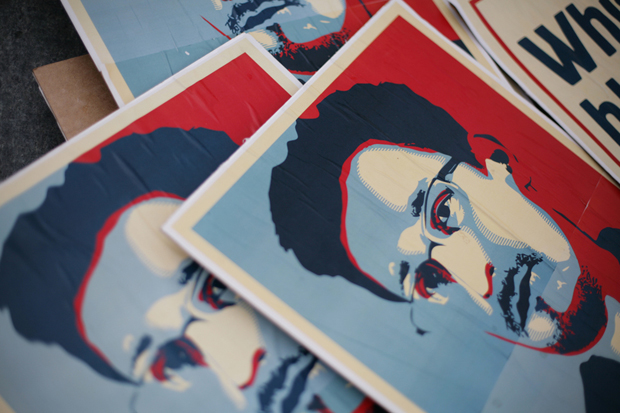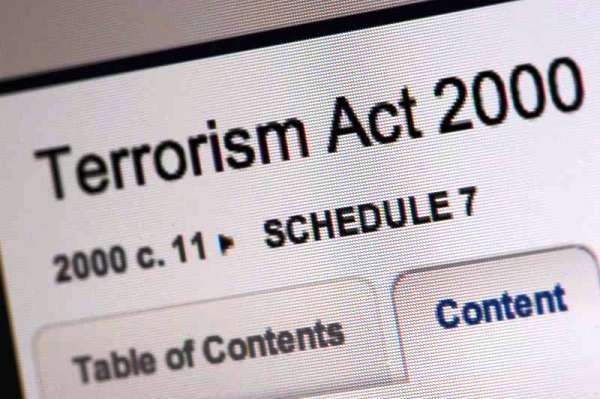Index relies entirely on the support of donors and readers to do its work.
Help us keep amplifying censored voices today.

(Photo: David von Blohn / Demotix)
This week saw some movement in the debate over NSA and GCHQ surveillance, and a court case that could have very serious consequences.
The court case first. One Wednesday and Thursday, the court of Appeal held a judicial review into the use of Schedule 7 of the Terrorism Act taken by David Miranda, partner of journalist Glenn Greenwald. Miranda was detained in transit at Heathrow airport under Schedule 7 while carrying encrypted documents that had emanated, ultimately, from whistleblower Edward Snowden.
The question was whether the authorities, knowing who Miranda was, what he was likely to be carrying, and his purpose for holding the documents, had a right to detain him under that particular piece of law.
It’s quite technical, but it comes down to whether carrying the documents Miranda was carrying could be seen as an act of terrorism or an act that could potentially aid terrorism (as the government and police argue) or as part of a journalistic enterprise (in essence, what Miranda is arguing).
Index and other organisations have weighed in in support of the argument put forward by Miranda’s team, as we worry that a ruling against Miranda could have serious implications. Journalism can often operate in dubious areas: whether material “leaked” or “stolen” for example, is a question that can have very different answers depending on who you ask.
In this case, the UK government very clearly maintains that the documents have been stolen and should be given back. Furthermore, they believe that they could fall into the hands of the wrong people – terrorists or hostile states, if not in the control of security services.
That, by the way, was very interesting indeed. The Home Office’s case suggested Russia, where Edward Snowden has been granted temporary asylum, is a hostile state.
The other side of this argument is that Miranda was assisting in journalism. This will involve, on occasion, having documents others would rather you did not have. The act of journalism is to sift these documents and decide where the stories lie within them. There was considerable back and forth on what “responsible journalism” constitutes during the hearing, but ultimately, it must be up to an editor what goes into a paper.
The Guardian’s Alan Rusbridger maintains he has acted with absolute responsibility. And GCHQ have as yet not claimed that agents have been endangered as a result of the Guardian’s revelations.
But at a hearing of parliament’s Intelligence and Security Committee (the ISC) on Thursday, spy chiefs insisted that Britain’s enemies were “rubbing their hands with glee” at the Guardian’s publications, and that terrorist chatter online had “gone dark” (i.e. more difficult to trace) since the first stories had appeared.
What next for the surveillance debate? The ISC performance was generally held to be weak. Rory Stewart MP has suggested it be composed more democratically, with an opposition MP at its head. The general demand on surveillance seems fairly low key: more scrutiny, less scope for random snooping.
Meanwhile the judges will mull over the Miranda case, and, we hope, come to the conclusion that whatever the young Brazilian was doing, it wasn’t terrorism.
This article was originally posted on 8 Nov 2013 at indexoncensorship.org
Index on Censorship supports today’s court challenge to the use of counter-terrorism powers to detain David Miranda at Heathrow airport in August. Index is a member of a coalition of free speech and media organisations that has made a written submission in support of Miranda’s hearing.
Online Editor Sean Gallagher said:
‘The Terrorism Act should be used to counter terrorism not to undermine investigative journalism into stories that are in the public interest, such as the ongoing revelations about mass surveillance by The Guardian and David Miranda’s partner, Glenn Greenwald. Misusing counter terrorism laws in this way is an attack on the free expression rights of journalists and their sources.’
The judicial review case will decide if it was lawful to use Schedule 7 of the Terrorism Act to detain Miranda and take confidential materials from him.
Written Submissions of the Coalition of Media and Free Speech Organisatons
 The examination and detention of David Miranda on 18 August at Heathrow Airport has brought Schedule 7 of the Terrorism Act 2000 in to sharp focus. Its purpose is to deter terrorism, an aim that it strives to achieve through facilitating the stop, search and examination (under compulsion) of individuals. I say individuals rather than suspects as there does not need to be any reasonable suspicion that any terrorist offence has been or will be committed. That said the selection of individuals is to be based on “informed considerations” (such as intelligence), should not be used arbritrarily and must only be applied to determine those who may be concerned in acts of terrorism. The power only applies to those believed to be entering or departing the United Kingdom and this belief must be justifiable in the individual circumstances.
The examination and detention of David Miranda on 18 August at Heathrow Airport has brought Schedule 7 of the Terrorism Act 2000 in to sharp focus. Its purpose is to deter terrorism, an aim that it strives to achieve through facilitating the stop, search and examination (under compulsion) of individuals. I say individuals rather than suspects as there does not need to be any reasonable suspicion that any terrorist offence has been or will be committed. That said the selection of individuals is to be based on “informed considerations” (such as intelligence), should not be used arbritrarily and must only be applied to determine those who may be concerned in acts of terrorism. The power only applies to those believed to be entering or departing the United Kingdom and this belief must be justifiable in the individual circumstances.
Be in no doubt that, whatever the expressed safeguards as to informed selection and justifiable beliefs, Schedule 7 is draconian. It was meant to be. It was aimed at preventing terrorism through exceptional legislative means. It exceptionally permits individuals to be stopped, questioned under threat of prosecution if they refuse to answer and their possessions seized (under threat of prosecution) should they fail to comply. It turns the accepted approach to criminal suspects on its head; the need to demonstrate a prior reasonable suspicion of offending is removed and the protection of silence is pierced by a compulsion to answer all questions. It is a blunt but arguably necessary tool in the fight against terror. The danger is that it becomes a blunt tool to batter down doors unconnected with terrorism. It cannot and should not be applied as a means to achieve any other objective.
In order to obtain confidential or sensitive information such as journalistic content the police must ordinarily undergo a route that involves obtaining a production order. To obtain such an order they must essentially satisfy a court that the order is justified and the protection afforded to the material can be overcome. Evidently Schedule 7 was never meant to take aim at journalism but, given the powers of compelled answers and seizure of material, one can instantly appreciate the fast lane route it would provide to obtaining information for extraneous intelligence purposes. That would be an abuse of the Act, a likely breach of Article 10 (freedom of expression) and unlawful on a number of levels but how can we safeguard against it? “Quis custodiet ipsos custodies” [who will guard the Guardians] wrote Juvenal. Rather apt.
Dan Hyde is a partner at HowardKennedyFsi LLP
This article was originally published on 22 Aug, 2013 at indexoncensorship.org
Statement from Gwendolen Morgan of Bindmans LLP after David Miranda wins a limited injunction preventing UK government from “inspecting, copying or sharing” data seized from him at Heathrow Airport on 19 August.
Miranda, the partner of Guardian journalist Glenn Greenwald, was detained and questioned by UK police for nine hours, and had data drives, believed to hold information leaked by NSA whistleblower Edward Snowden, seized from him.
According to the Guardian,
The court ruled the authorities must not inspect the data nor distribute it domestically or to any foreign government or agency unless it is for the purpose of ensuring the protection national security or for investigating whether Miranda is himself involved in the commission, instigation or preparation of an act of terrorism.
But the ruling also meant that data cannot be used for the purposes of criminal investigation
via the Guardian